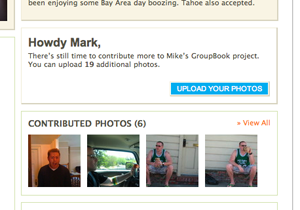Blurb, the on-demand print service with a specialization in photographic layouts, is expanding its “crowd sourcing” strategy onto, where else, but Facebook with a new app that brings people together to create professional quality books.
This past October Blurb deployed a new feature for its desktop publishing software called Community Books that could be used to create books with others. The new Facebook application, called GroupBook and found here, does essentially the same thing except without the need for any download on the part of your friends.
Want to compile a book with all of the photos that you and your friends took at graduation? Invite them to participate in a GroupBook project and they can contribute up to 20 of their own photos with a simple upload form on Facebook. Once the contribution period ends, you can turn these photos into a book with Blurb’s BookSmart desktop client.
My only real gripe is that friends can’t submit captions along with their photos, leaving book owners to make ones up themselves. Also, you can’t pull photos directly from Facebook collections – a limitation imposed by the social network itself since Facebook doesn’t store and serve high enough quality images for print.
Blurb’s social features form a smart strategy in an age when electronic media is replacing many printed materials. I imagine this will help the company drive demand for so-called “personal” books, ones created not for profit. It shouldn’t have an effect, however, on the print of marketing materials, which form half of Blurb’s businesses.
When asked about Amazon’s recent foray into on-demand print services, CEO Eileen Gittins expressed a lack of concern that it would cut into Blurb’s business. Since relatively few people use Blurb to create books intended for sale (on Amazon or elsewhere) anyway, she doesn’t think the giant ecommerce site has any real competitive advantage in this area. Plus she thinks Blurb’s economics are better because the company does not take any cut from the sale of books, it just charges printers for the leads it makes.
